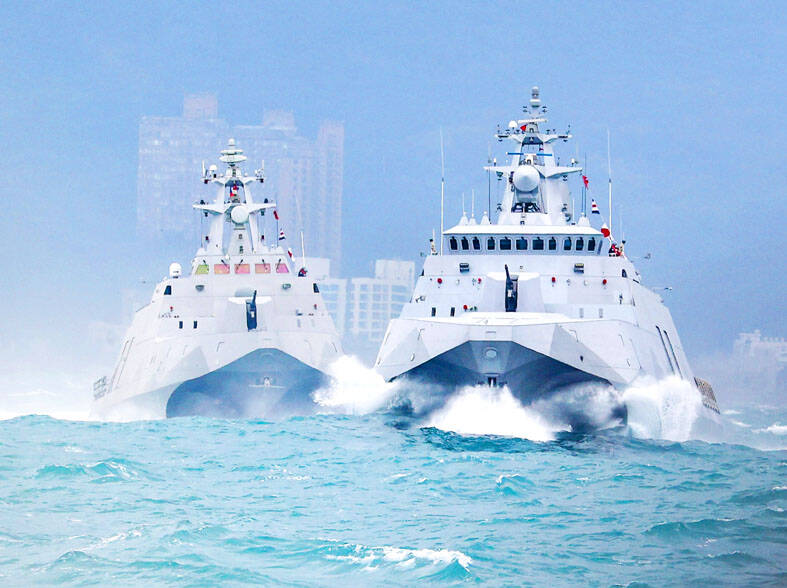The Ministry of National Defense on Wednesday awarded Lung Teh Shipbuilding (龍德造船) a NT$9.7 billion Co (US$317.57 million) contract to build five Tuo Chiang-class corvettes with anti-ship capabilities, a defense official familiar with the matter said yesterday.
The corvettes would carry vertical launchers for four Hsiung Feng II (HF-2) missiles, as well as eight Hsiung Feng III (HF-3) anti-ship missiles, in contrast to ships configured for anti-air warfare, which carry eight HF-2 and four HF-3 missiles, the official said, speaking on condition of anonymity.
The anti-ship corvettes would be armed for improved standoff range against surface combatants and carry the latest HF-2 variant, which has an enhanced range, larger maneuverability and updated electronic warfare technology, he said.

Photo: CNA
Lung Teh was chosen in large part because the shipbuilder had more experience than its competitors, he said.
It previously built the prototype for the Tuo Chiang-class and three anti-air corvettes, and has been tasked with building three more ships of that configuration, he said.
An anti-ship Tu Chiang-class corvette costs NT$7.56 billion when the platform, munitions, combat systems and logistics costs are included, while the program’s overall costs are projected at NT$37.8 billion, government reports showed.
A fleet of 12 Tou-Chiang class corvettes is planned, including the prototype, six anti-aircraft corvettes and five anti-ship corvettes, with the delivery of the last ship scheduled before the end of 2026.
Separately, a copy of the defense ministry’s latest budget proposal to the legislature confirmed that the navy’s submarine rescue ship program would receive NT$10.1 billion under a five-year force restructuring plan.
The move came a year after Democratic Progressive Party legislators Wang Ting-yu (王定宇) and Lin Shu-fen (林淑芬) joined independent Legislator Freddy Lim (林昶佐) in calling for the nation’s indigenous defense submarine program to have dedicated rescue capabilites.
A separate defense official familiar with the matter yesterday said that the budget would enable the navy to develop a defense submarine with deep-sea rescue capabilities, including an adjunct ship, crew and support facilities.
The defense submarine would come in addition to the first of a new class of 3,250-tonne rescue-and-salvage ships, which would enter service in September, the official said, speaking on condition of anonymity.
The new ship’s diving bell would be able to operate at depths of up to 100m and it would be equipped with a remotely operated vehicle that can dive up to 500m, they added.
Even though the ship would be operated by the navy, it would not be used for defense tasks.
The submarine’s rescue ship would have the same capabilities as vessels operated by the US Navy, but it is not yet clear whether it would be interoperable with the navies of the US and Japan, the official said, adding that the matter would have to be discussed with the US.

AIR SUPPORT: The Ministry of National Defense thanked the US for the delivery, adding that it was an indicator of the White House’s commitment to the Taiwan Relations Act Deputy Minister of National Defense Po Horng-huei (柏鴻輝) and Representative to the US Alexander Yui on Friday attended a delivery ceremony for the first of Taiwan’s long-awaited 66 F-16C/D Block 70 jets at a Lockheed Martin Corp factory in Greenville, South Carolina. “We are so proud to be the global home of the F-16 and to support Taiwan’s air defense capabilities,” US Representative William Timmons wrote on X, alongside a photograph of Taiwanese and US officials at the event. The F-16C/D Block 70 jets Taiwan ordered have the same capabilities as aircraft that had been upgraded to F-16Vs. The batch of Lockheed Martin

GRIDLOCK: The National Fire Agency’s Special Search and Rescue team is on standby to travel to the countries to help out with the rescue effort A powerful earthquake rocked Myanmar and neighboring Thailand yesterday, killing at least three people in Bangkok and burying dozens when a high-rise building under construction collapsed. Footage shared on social media from Myanmar’s second-largest city showed widespread destruction, raising fears that many were trapped under the rubble or killed. The magnitude 7.7 earthquake, with an epicenter near Mandalay in Myanmar, struck at midday and was followed by a strong magnitude 6.4 aftershock. The extent of death, injury and destruction — especially in Myanmar, which is embroiled in a civil war and where information is tightly controlled at the best of times —

Taiwan was ranked the fourth-safest country in the world with a score of 82.9, trailing only Andorra, the United Arab Emirates and Qatar in Numbeo’s Safety Index by Country report. Taiwan’s score improved by 0.1 points compared with last year’s mid-year report, which had Taiwan fourth with a score of 82.8. However, both scores were lower than in last year’s first review, when Taiwan scored 83.3, and are a long way from when Taiwan was named the second-safest country in the world in 2021, scoring 84.8. Taiwan ranked higher than Singapore in ninth with a score of 77.4 and Japan in 10th with

SECURITY RISK: If there is a conflict between China and Taiwan, ‘there would likely be significant consequences to global economic and security interests,’ it said China remains the top military and cyber threat to the US and continues to make progress on capabilities to seize Taiwan, a report by US intelligence agencies said on Tuesday. The report provides an overview of the “collective insights” of top US intelligence agencies about the security threats to the US posed by foreign nations and criminal organizations. In its Annual Threat Assessment, the agencies divided threats facing the US into two broad categories, “nonstate transnational criminals and terrorists” and “major state actors,” with China, Russia, Iran and North Korea named. Of those countries, “China presents the most comprehensive and robust military threat